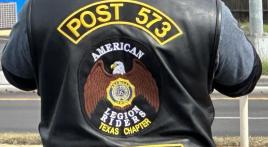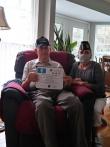Shortly after World War II and fighting ended in 1945, I was drafted into the Army of the United States.
At the Induction Center in Camp Atterbury near Columbus, Ind., a veteran with stripes from shoulder to wrist gave us a spiel about how we were "in for the duration plus six months and only God knew how long that would be." He said there was a "good deal" available to us if we would take it. All we had to do was accept a discharge and enlist for a period of 18 months, two years, or three years. Then we would know when we would be getting out and could begin making plans for our future. Also, we would be eligible for the GI Bill and educational benefits—one month for each month served. And the "big carrot" was if we would enlist for three years, we could choose the branch of service we wanted to serve in, choose the overseas theater of operations we preferred and would have enough time for a college degree on the GI Bill.
That settled it for me. I didn't know how I would be able to finance a college education, so I chose a three-year enlistment in the Army Air Corps with Europe for my overseas theater of operation.
Draftees' medical examination for military service included a series of shots for many diseases. We were told to remove our shirts to bare our arms. I was in a long line of fellow draftees who moved slowly along as pairs of GIs with syringes stabbed us in each arm.
The next thing I remembered was marching in formation.
Bewildered, I told fellows around me I had a memory loss and ask if they knew what happened. They laughed and said the guys who inoculated us were draftees like us who had been told to give the shots. They had no training or experience and were kind of rough, maybe my system had reacted to the shots. The winter weather was bitterly cold and we were not wearing jackets. Then someone remembered when I reached to pick up my shirt I had fallen and hit my head against a support pillar in the building and I was only semi-conscious as we re-formed and marched away.
We traveled by train for basic training at Keesler Field in Biloxi, Miss. The train arrived in Biloxi at dusk on a December day. The temperature was warm enough to work up a sweat carrying our bedding and uniform supplies to the barracks after receiving them from the quartermaster in the squadron assembly area. We struggled under the load. We were pooped from our trip and from dragging all our private and government-issued items to our new home. Sleep came quickly. During the night I had an urge to urinate and there were no toilet facilities in the barracks. There was a brick toilet facility about a half-block away, so I started toward it in my underwear, remembering how hot I'd been earlier. The temperature had dropped so drastically, I thought I was going to freeze.
Training consisted of learning how to wear the uniform, how to salute, when to salute, who to salute and general indoctrination on military history. A carbine was issued to each of us, and we were taught the Army way to use it. We were given general aptitude tests to ascertain what career fields we might have natural inclinations toward. I had heard of radio operators going bonkers after hearing and sending dits and dahs for many months, so I deliberately flunked that part of the test.
Later I was told my next assignment would be to the School of Cryptography at Scott Field, Belleville, Ill., near St. Louis.
While still at Keesler, in the evenings I would sometimes put on a pair of aviator sunglasses and cap with visor and stroll around the area. In the low light of the dusk many a Private would think I was an officer and salute me, so this private saluted them back.
We were issued only one pair of fatigue clothes. When I thought we were finished training for the week, I washed them and hung them to dry. Soon the first sergeant rousted us out and told us we were going on a 30-mile hike because we had not performed well during the week. My fatigues were soaking wet. The only dry clothing I had to wear was a sweatsuit. I put it on and tried to stay hidden behind others so the sergeant wouldn't see me. While we hiked, he rode in a jeep and periodically drove by us. We marched across the back bay bridge to D'Iberville and rested for a while. All the time I was trying to stay out of sight. We returned to the squadron area and still in group formation were receiving a chewing out by the first soldier when he saw me. He had a few choice words to say, but released me with the others.
Immediately adjacent to the airfield were businesses waiting to prey upon young soldiers to separate them from their modest pay. I was fascinated by the multicolored, electronic games with their melodious sounds. They were gambling devices. After pay day I visited some of those establishments and returned to the barracks with bulging pockets of winnings. I was happy and proud. I thought I must have a magic touch. The next night I went back again and returned to the barracks as light as a feather, cleaned out completely.
Most of us were young and naive. We did whatever we were told from fear of unknown disciplinary action that refusal might bring. One time a sergeant with his arm in a cast called me aside privately and asked me to manicure his fingernails. He said he had noticed that I kept mine looking good and he couldn't do his with the cast on. I felt this a bit strange but did it. Another time two cooks told several of us on kitchen police to stand on a bench in the locker room and drop our drawers. I think we all wondered what this was about. The two cooks walked up and down in front of us inspecting our genitals by looking. They told us to pull up our pants and get on with our work. Only God knows what they were looking for.




